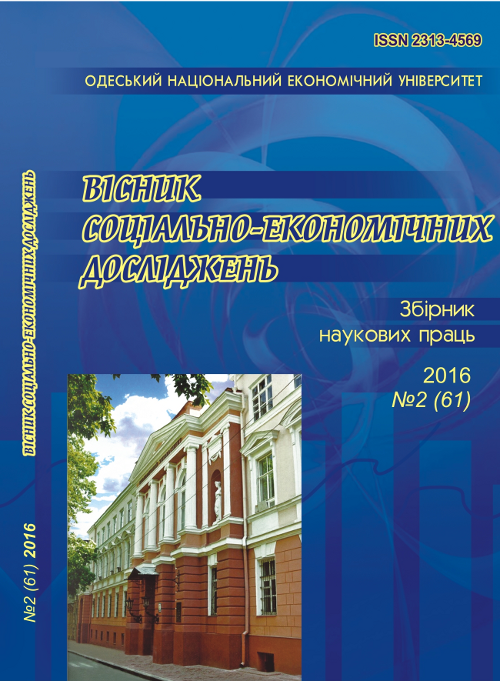Theoretical and methodological view on the recreation in the management system of national economy
DOI:
https://doi.org/10.33987/vsed.2(61).2016.64-70Keywords:
recreation, management system, national economy, system thinkingAbstract
The recreation as a component of the macroeconomics from the theoretical and methodological perspective is researched in the article. The system thinking allows us to generalize and identify relationships of «recreation» subsystem in the management system of national economy. The attention is focused on the management aspects, particularly on management functions such as forecasting, regulation, etc., which correlate with the main directions of scientific economic research on national level. Separate components of the recreational subsystem are analyzed: input elements, namely resources of recreational sectors that can come directly from the environment or through the management system of national economy; internal relationships: sectoral and territorial, interregional and cluster interactions; output elements represented as results of recreational sustainable development. The balancing of recreation system development is interpreted as turning on programmed trajectory within the allowed deviation through the state maintaining of its movement.
References
Slavik, R. V., Mykyta, M. M. (2015), Theoretical aspects of the research of territorial recreational systems [Teoretychni aspekty doslidzhennia terytorialnykh rekreatsiinykh system], Scientific bulletin of Uzhhorod university. Series «Economics», Vol. 1 (45), T. 1, pp. 101–104
Dutchak, S. V. (2014), Tourism-recreational resources of landscapes [Turystsko-rekreatsiini resursy landshaftiv], Rodovid, Chernivtsi, 196 p.
Van Mai, T., Bosch, O. J. H. (2010), Systems thinking approach as unique tool for sustainable tourism development: a case study in the Cat Ba biosphere reserve of Vietnam, Proceedings of 54th Annual conference of the international society for the systems sciences «Governance for a resilient planet», International society for the system thinking, Pocklington, York, pp. 827–845.
Halioui, S., Schmidt, M. (2016), Towards a holistic analysis of tourism sector in Tunisia: a system dynamics approach, Proceedings of the WEI international academic conference, The West Eeast institute, Boston, pp. 232–237.
Hrabar, M. V. (2012), System development of tourism and recreational industry: general specificity [Systemnyy rozvytok sfery turyzmu ta rekreatsii: zahalna spetsyfika], Herald of Khmelnytskyi national university, No. 2, Т. 1, pp. 249–256
Woodside, A. G. (2009), Applying systems thinking to sustainable golf tourism, Journal of travel research, Vol. 48, No. 2, pp. 205–215.
Odrekhivskiy, M. V. (2011), Methodological principles of organization and integration of recreational innovative enterprises to market economy [Metodolohichni pryntsypy orhanizatsii ta intehratsii rekreatsiynykh innovatsiynykh pidpryiemstv do rynkovoi ekonomiky], Regional economy, No. 2, pp. 69–77
Theoretical and applied aspects of recreational nature use in Ukraine (2010). Ed. by K. Y. Kilinska [Teoretychni ta prykladni aspekty rekreatsiynoho pryrodokorystuvanniia v Ukraini; vidp. red. K. Y. Kilinska], Chernivtsi national university, Chernivtsi, 248 p.
Bertalanffy, L. (1968), General system theory: foundations, development, applications, George Braziller, New York, 289 p.
Ashby, W. R. (1957), An introduction to cybernetics, Charman & Hall ltd, London, 295 p.
Mesarovic, M., Takahara, Y. (1975), General systems theory: mathematical foundations, Academic Press, Ink, New York, 268 p.
Petrushenko, M. M. (2012), Economical «games against nature»: solution model in the field of environmental conflicts management [Ekonomichni «ihry proty pryrody»: model pryiniattia rishen u sferi upravlinnia ekolohichnymy konfliktamy], Business Inform, No. 4, pp. 130–132
Simon, H. A. (1962), The architecture of complexity, Proceedings of the American philosophical society, Vol. 106, No. 6, pp. 467–482.
Anokhin, P. K. (1973), Principal issues of the general theory of functional systems [Printsipialnye voprosy obshchey teorii funktsionalnykh sistem], Principles of system organization of functions, Nauka, Moscow, pp. 5–61
Ukraintsev, B. S. (1972), Self-managing system and causality [Samoupravlyaemye sistemy i prichinnost], Mysl, Moscow, 252 p.
Wiener, N. (1989), The human use of human beings: cybernetics and society, Free association books, London, 199 p.
Mesarovich, М., Mako, D., Takhara, I. (1973), Theory of hierarchical multilevel systems [Teoriya ierarkhicheskhikh mnogouravnevykh system; per. s angl.], Mir, Moscow, 344 p.
Downloads
Published
Issue
Section
License
Copyright (c) 2016 Socio-Economic Research Bulletin

This work is licensed under a Creative Commons Attribution 4.0 International License.






